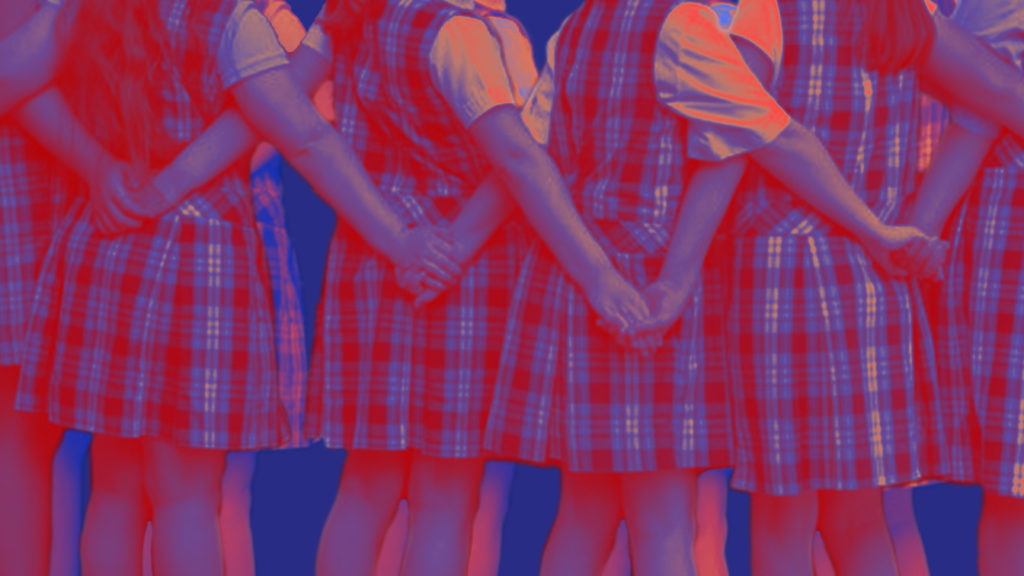ATHEISM: A CATHOLIC SCHOOL EDUCATION

Illustration by Saffron Sener
Yasmin Gehman
16 November 2019
As the words spilled out of my mouth, everyone within a ten foot radius turned and gasped in shock. Our school’s track star turned to face me —“Yasmin, you’re an atheist?” Concern plagued her voice, “I’ll pray for you.” And so it began.
I entered freshman year at my Catholic high school stumbling over newly learned prayers and songs expressing my devotion to God. I capitulated to the majority stance of Catholicism, accepting the teacher’s unchallenged claims and succumbing to their religious ideals. Day after day, I prayed the Our Fathers, the Hail Marys, the moments of silence—but for what? For something I may not truly believe in? I had never questioned the existence of God before the belief was forced upon me. Mandatory religion classes taught by teachers who were undoubtedly faithful, ironically, steered me away from acceptance of a higher power. Rather than passively affirm their convictions, I questioned their guidance.
I was painstakingly curious: examining the claims these religion teachers made, asking the ever feared “why’s” and “how’s,” not accepting “because it is in the Bible” as a valid answer. I became notorious for distracting the teacher; friends would excitedly nudge me as I walked into class, giving me an indication to start a rebuttal so they could do other work while I quarreled. I craved the exchanges—yearning for more explanation, a deeper insight, a different point of view. To the Catholic staff, my atheism was a one-way ticket to Hell—but to me, it was a belief, as valid as their Catholicism. I was learning more about myself through a disagreement with an unquestioned doctrine than I was when I blindly accepted someone else’s faith.
At first, I met the religion teacher’s instruction with contempt; I regretted my compliance with my parent’s decision to send me to Catholic school. I resented my polo and pleated skirt and dreaded religion class, where I was met with intrusive and imperious teachings—all of which I disagreed with. I vehemently declared my atheism, largely out of spite, wanting no part of this Catholic schooling. It was not until I entered my senior year of high school that I finally met a teacher willing to put aside her steadfast beliefs to reason with me. She took the time to analyze the Bible’s readings and decrees from a historical standpoint rather than an unquestionable, yet unexplainable, point of view. I still found myself at odds with the idea of an almighty, omnipresent ruler; but, I believed that in order to truly claim that I denied the concept of God, I needed to be fully educated and aware of what I was going against. So I began learning.
I studied passages from the Bible, intrigued by the accounts of the apostles and the commandments placed upon the disciples of God. As the year progressed, I began looking forward to religion class, and soon it became my favorite period. I learned to love studying a topic I disagreed with. I found the history, the accounts, the people fascinating. I no longer saw God as a viable belief, but more as a way to interpret humanity and the way we cope with hardship. I learned that the Bible is filled with countless life lessons and insightful ideals that are unquestionably important. It is a great book for understanding how to treat others as well as yourself. I did not need to agree with the overarching belief in God, but I could appreciate the Bible’s ethical mores and principles.
My Catholic schooling revealed that disagreeing with a belief does not excuse being ignorant of it. I was able to learn to accept new perspectives, and use skepticism as a tool of insight, not of opposition. Transitioning into college, these realizations have immensely shaped my views. As a student at one of the most liberal and historically politically active institutions in the country, I am so thankful I was forced to learn the ins and outs of Catholicism. My religious curiosity has not faded and at Cal, as I am surrounded by people from a multitude of religious backgrounds, many of whom welcome an intellectual conversation about their beliefs. SexLocals My experience as a student in a Catholic school has made me more confident and comfortable exploring my interest in other religions. This education provided me with the tools to appreciate and respect a conflicting point of view; it taught me the skills to argue with knowledge and reason, not just emotion; it helped me recognize that intolerance is a means of division, not unity—that it is acceptable to go against the norm, but it is unacceptable to do so without reason.
What my teachers probably viewed as contentious and annoying, I always deemed educational. What power do beliefs hold if they cannot withstand examination? I do not believe in God because I believe in what can be proven with science, with data, with numbers, with reasoning. This stance may not last forever—I know I have the capacity to change, just as I did my freshman year of high school. I am not so closed minded or arrogant to say unquestionably that God does not exist; I am just one person, with one opinion, in one point in time, who is open to anything the future holds.

